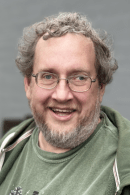Daniel M. O'Gorman, Ph.D.

Assistant Professor, History
- dogorman@stmartin.edu
Old Main 321
Areas of Expertise
- Late Antiquity
- Early Medieval Europe
- Anglo-Saxon England
- "Renaissance" of the Twelfth Century
- Black Death and the Crisis of the Fourteenth Century
- Old and Middle English Literature and Drama
Education
Ph.D., Loyola University Chicago
M.A., Loyola University Chicago
B.A., Loyola University Chicago
Background
Going back to my undergraduate studies, my primary research interests have been directed towards England in the 9th-11th centuries. For my doctorate, which was awarded in 2015, my dissertation dealt with the application of the modern concepts of "standards" and "standardization" to religious and political institutions of that period. (That Benedictine abbeys were among the most prominent of these makes Saint Martin's feel like a particularly appropriate fit for me.) Since then, I have taught at Loyola Chicago, Washington University in St. Louis and, after moving out to the Pacific Northwest, Lake Washington Institute of Technology, Pacific Lutheran and Seattle University. Although my training has been in the Middle Ages, I have also taught classes in both World and US History, including upper-division courses on topics as varied as Civil War and Reconstruction and African American History.
I am originally from the Midwest — specifically St. Louis — but came out to the Pacific Northwest in 2018. Before then, I had lived (and taught) in Nashville, Chicago, Dubai and Abu Dhabi. This itinerate lifestyle allowed me to indulge my linked interests in travel and history. Since arriving in Western Washington, I have tried to take advantage of the opportunities afforded by a vibrant and cosmopolitan urban environment as well as the extraordinary mixture of mountains, forests, ocean and high desert, all within close proximity. While I have not foresworn my allegiance to the St. Louis Cardinals, I am a semiregular attendee at Tacoma Rainiers games.
Areas of Interest
My research is directed towards the exploration of a fundamental question: By what process was a sense of ethnic identity engendered among the peoples of later Anglo-Saxon England? (I.e., how and why did groups of self-described Angles, Saxons, Jutes, Franks, Frisians, Danes, Celts and Britons all start to consider themselves "English?") The study of this formation of identity — or "ethnogenesis" — in the early medieval period has traditionally favored a top-down explanation. Lay and religious elites, it is argued, nurtured traditions and legends around which such an identity could coalesce.
My investigations have suggested an alternative approach, one which deemphasizes hierarchy and elites in favor of collaborative and "horizontal" dynamics. The language of standardization offers a lens by which such dynamics can be discerned. It also suggests greater strength and resilience in the society and institutions of that period than historians have previously allowed for.
